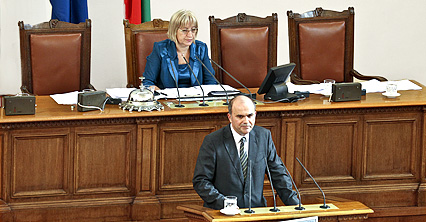News
Parliament elects Biser Petkov Governor of the National Social Security Institute
08/09/2011
 The Parliament adopted the report on the activity of the Committee on Disclosure of Documents and Announcing Affiliation of Bulgarian Citizens to the State Security and the Intelligence Services of the Bulgarian Army for the period December 20, 2010 – July 20, 2011. It is noted in the report, that during the above mentioned period the Committee has performed checks on 10 914 persons and has established affiliation to the State security Service and the Intelligence Services of the Bulgarian Army of 921 Bulgarian citizens. On its website the Committee has set up a data base regarding the checked persons which contains over 36 000 entries. Under the guidance of the Committee’s members preparatory work for the publishing of five new editions is ongoing. The five collections will be entitled: ‘State Security and Political Police’, “State Security and the Prague Spring”, ‘State Security and December 10”, “The Military Intelligence in the State Security Documents” and ‘State Security in Education’.
The Parliament adopted the report on the activity of the Committee on Disclosure of Documents and Announcing Affiliation of Bulgarian Citizens to the State Security and the Intelligence Services of the Bulgarian Army for the period December 20, 2010 – July 20, 2011. It is noted in the report, that during the above mentioned period the Committee has performed checks on 10 914 persons and has established affiliation to the State security Service and the Intelligence Services of the Bulgarian Army of 921 Bulgarian citizens. On its website the Committee has set up a data base regarding the checked persons which contains over 36 000 entries. Under the guidance of the Committee’s members preparatory work for the publishing of five new editions is ongoing. The five collections will be entitled: ‘State Security and Political Police’, “State Security and the Prague Spring”, ‘State Security and December 10”, “The Military Intelligence in the State Security Documents” and ‘State Security in Education’.A penalty imposed under the Edict for Combating Petty Hooliganism shall be challenged from now on. This was decided by the National Assembly at the first reading of Edict 904 from 1963 for combating petty hooliganism. Within 24 hours of issuance a ruling by a district judge that imposes an administrative penalty shall be subject to appeal before the relevant regional court on cassation grounds laid down in Criminal Procedure Code. When the penalty is detention under arrest, the person may be detained for a term of 24 hours for his/her transfer to the Regional Court. The relevant prosecutor shall be informed of the appeal together with witnesses who have attended the case hearing in the district court. Another amendment envisages the possibility for an act of petty hooliganism performed by a person under 16 years of age to impose a penalty of 15 days of detention under arrest, a fine of 100 to 500 BGN as well as free labor of 40 to 160 work hours for the benefit of the society.
The Parliament adopted at first reading amendments to the Personal Data Act providing for the protection of personal data for the needs of the police and judicial cooperation on criminal procedure issues. In cases when data are provided or received for the purposes of the cooperation with the police or the judiciary of a EU member-state, or the bodies and information systems established by virtue of the Founding Treaties, the amendments envisage the possibility of processing this data in compliance with the requirements of the law. The grounds for refusal on behalf of the administrator to submit requested data are further enlisted. The Personal Data Protection Committee shall be the independent national body to perform data protection oversight which will enjoy effective powers of interference with regard to the lawfulness of personal data processing. The personal data administrator shall be responsible form now on for keeping a register of the submitted and provided data. The observation of certain limitations in the data processing are also envisaged, related to the national legislation of the EU member-state providing information.

Latest news
- 22/04/2021
The Parliament imposed a moratorium on concessions, real estate deals and appointments pending the election of a new cabinet or caretaker government - 16/04/2021
By 156 votes “in favour”, the National Assembly accepted the resignation of the Council of Ministers with Prime Minister Boyko Borisov - 15/04/2021
Speech by Mrs. Iva Miteva upon her election as a President of the 45th National Assembly - 15/04/2021
The Member of Parliament Iva Miteva was elected President of the 45th National Assembly - 15/04/2021
The Members of the 45th National Assembly were officially sworn in - 03/03/2021
The President of the National Assembly Tsveta Karayancheva and MPs attended the solemn fireworks-retreat on the occasion of the Liberation of Bulgaria - 03/03/2021
Every Bulgarian should preserve and honour the memory of those glorious ancestors, thanks to whom Bulgaria exists today, said the President of the National Assembly Tsveta Karayancheva in Gabrovo - 03/03/2021
Today we are on Shipka to pay our respects to all the heroes who sacrificed their lives for freedom, said the President of the National Assembly Tsveta Karayancheva after climbing Shipka Peak together with young people from all over the country - 02/03/2021
The Vice-President of the National Assembly Valeri Simeonov received an award from the Bulgarian Republican Self-Government in Hungary - 26/02/2021
The Parliament adopted at second reading amendments to the Measures Against Money Laundering Act
 Български
Български English
English